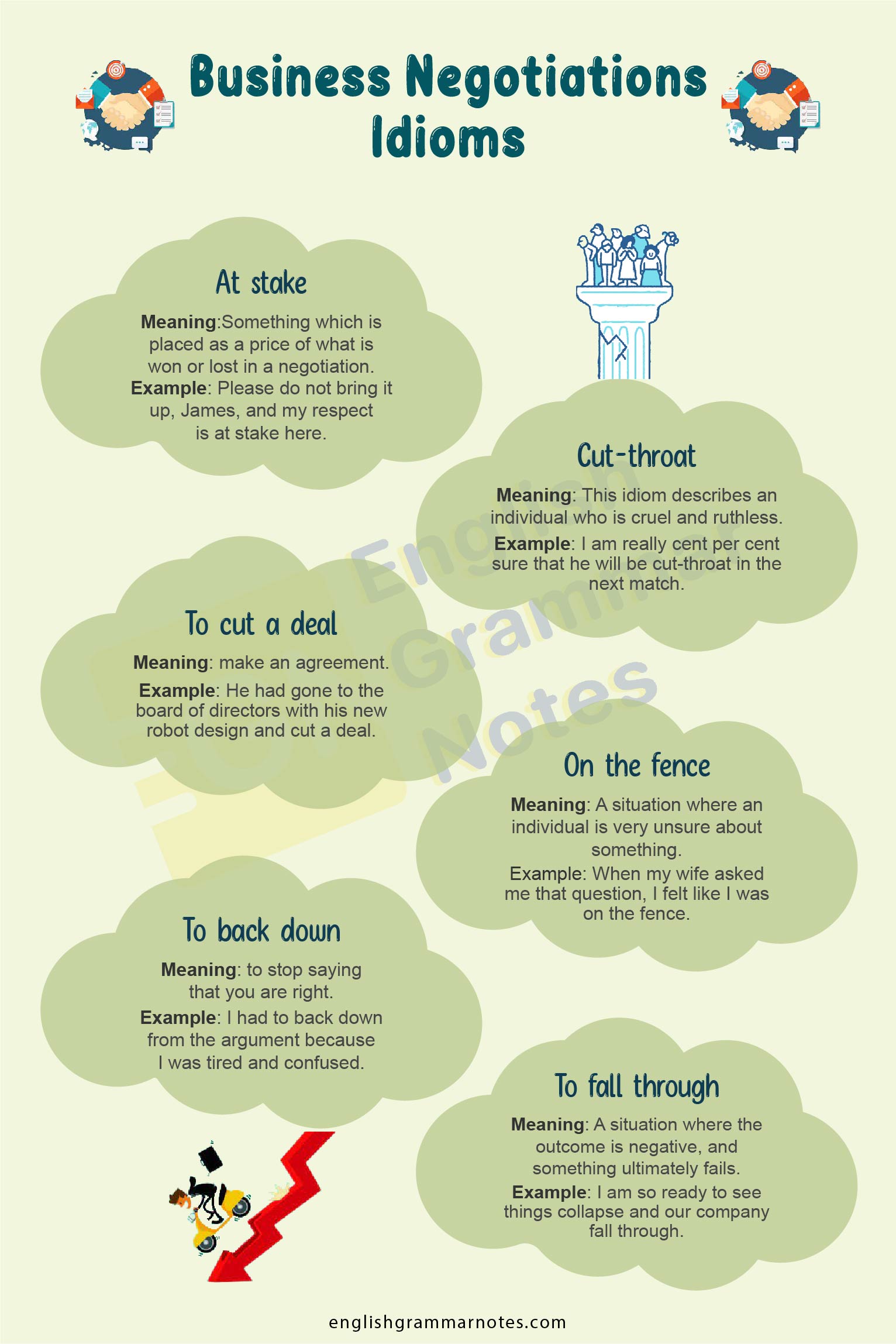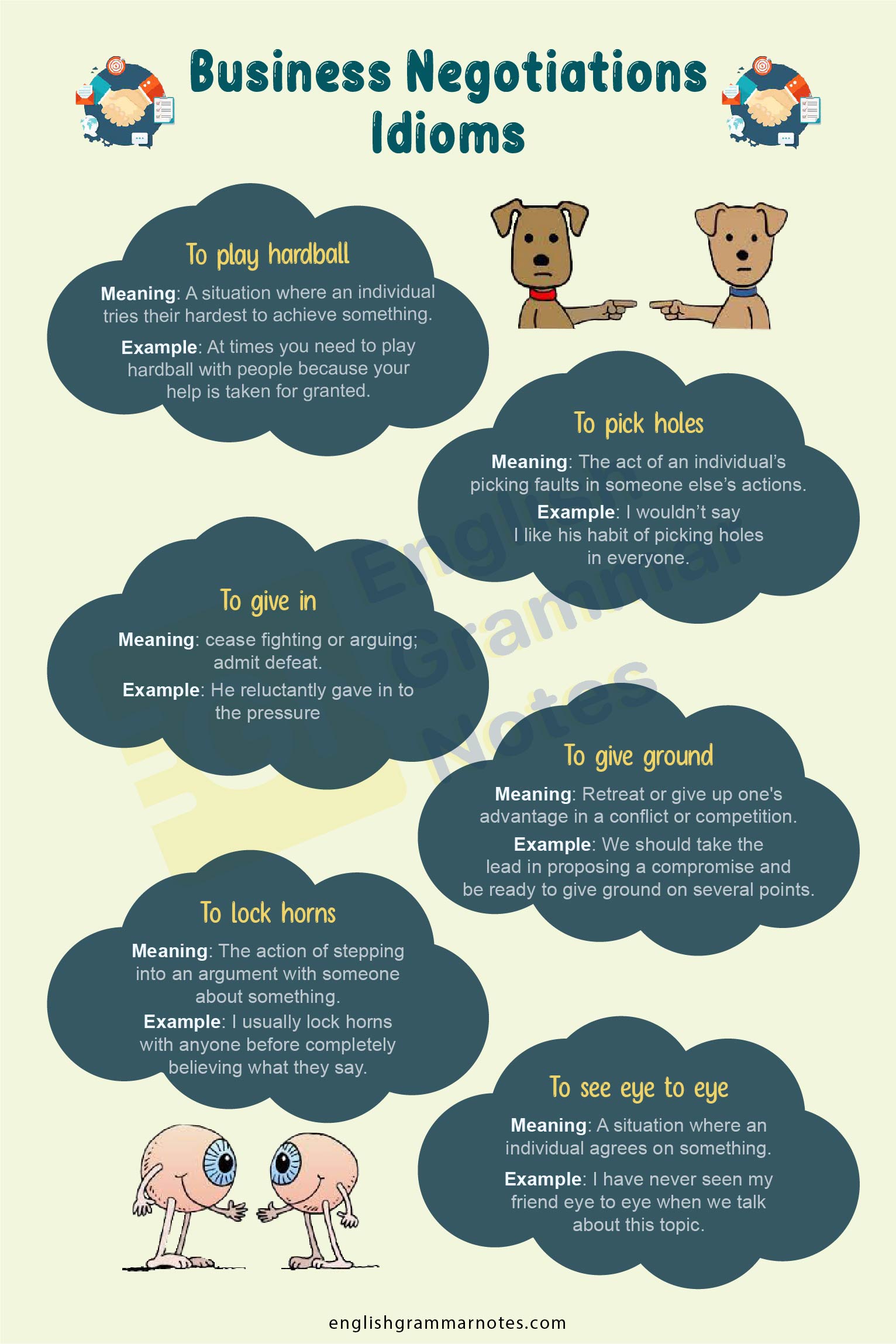Idioms for Business Negotiations: The English language is made with multiple components that cater to the aids of people around the world in making crisp and clear sentences for daily uses. One of the examples of these components that help us spice up our daily boring sentences is known universally as idioms.
Idioms are of various types ranging from food idioms to negotiation idioms and marketing idioms.
These idioms help us to structure our daily sentences better and make them sound different. For the convenience of people who look forward to using more expressions while talking, we have compiled a list of Idioms in business communication. These include idioms for agreeing and much more vital information one needs to know.
Enrich your Vocabulary by practicing the English Idioms that are commonly used in everyday conversations and understand their actual meaning.
Name of Idioms for Business Negotiations
List of Idioms for Business Negotiations
- At stake
- Below the belt
- Common ground
- Cut-throat
- Give and take
- On the fence
- Out of the question
- Over my dead body
- The ball is in one’s court
- The short end of the stick
- The upper hand
- To back down
- To bend over backwards
- To call the shots
- To change someone’s mind
- To cut a deal
- To draw the line
- To drive a hard bargain
- To fall through
- To get down to business
- To give ground
- To give in
- To go back on
- To go over like a lead balloon
- To have an ace up one’s sleeve
- To iron something out
- To lay one’s cards on the table
- To lock horns
- To make up one’s mind
- To meet someone half-way
- To pick holes
- To play hardball
- To play one’s cards right
- To put one’s foot down
- To put words in someone’s mouth
- To reach a stalemate
- To see eye to eye
- To sleep on it
- To stand one’s ground
- To stick to one’s guns
- To strong-arm someone
- To take sides
- To talk someone into something
- To talk someone out of something
- Until someone is blue in the face
Meaning and Examples of some commonly used Idioms for Business Negotiations
At stake
Meaning: This idiom describes something which is placed as a price of what is won or lost in a negotiation.
Example: Please do not bring it up, James, and my respect is at stake here.
Below the belt
Meaning: This idiom describes a particular comment or accusation made by someone in a situation that is unjust and insulting.
Example: The negative remarks about his sister were below the belt and untrue.
Common ground
Meaning: This idiom describes the areas or disciplines in which two or more individual’s share the same interest.
Example: Due to the little common ground between them, arguments happen more frequently.
Cut-throat
Meaning: This idiom describes an individual who is cruel and ruthless, or harsh.
Example: I am really cent per cent sure that he will be cut-throat in the next match.
Give and take
Meaning: This idiom describes a situation where two individuals lay out specific criteria for themselves, and they negotiate with each other by giving and receiving something between them.
Example: If you want to get the project finished faster, I advise you work on trying to give and take.
On the fence
Meaning: This idiom describes a situation where an individual is very unsure about something.
Example: When my wife asked me that question, I felt like I was on the fence.
Out of the question
Meaning: This idiom describes a situation where an individual places negative bets against something which is the most unlikely to happen.
Example: Do you think we will win with this strategy? Let me tell you, even going as close to ranking third is out of the question.
Over my dead body
Meaning: This idiom describes something an individual will prevent from happening with all their might.
Example: Yeah, you can go ahead to the building, but you’ll go with Phill over my dead body.
The ball is in one’s court
Meaning: This idiom describes a situation where an individual has the power to decide what to do or how to proceed with something.
Example: I swear when the ball is in my court, I will revolutionize the system altogether.
The short end of the stick
Meaning: This idiom describes a situation where an individual is unfairly treated or insulted.
Example: Due to your evil deeds, he is going to be on the short end of the stick when pleading not guilty.
The upper hand
Meaning: This idiom describes a situation where an individual is at an advantage compared to the opposite party.
Example: With our tactics in place and our sales running smoothly, we indeed have the upper hand.
To back down
Meaning: This idiom describes a situation where an individual has to accept what someone else is saying despite them not agreeing to the opinions.
Example: I had to back down from the argument because I was tired and confused.
To bend over backwards
Meaning: This idiom describes the action of trying to do anything and everything possible to try to please someone.
Example: The staff has bent over backwards to try and convince our boss to pay more.
To call the shots
Meaning: This idiom describes a situation where an individual has the supreme power or authority to make decisions.
Example: I don’t have any idea about this; let me call the shots to make a closing statement.
To change someone’s mind
Meaning: This idiom describes the action of trying to change an individual’s mind or opinion about someone. It can be determined as an approach to alter one’s own thoughts.
Example: You can possibly get away with this if you try hard enough to change her mind, and if you fail, better luck next time, my friend.
To cut a deal
Meaning: This idiom describes a situation where two people mutually negotiate in some deal or beneficial arrangement.
Example: If our company wins this position, I will approach the ideas you have and approve the company to cut a deal with them.
To draw the line
Meaning: This idiom describes the act of putting a limit to an individual’s actions for them to avoid fraudulence or negative impacts.
Example: If she behaves harshly to you repeatedly and it hurts you, I think it’s time to draw the line.
To drive a hard bargain
Meaning: This idiom describes the action of fiercely pushing your opinions to win a bargain and go by your idea.
Example: I think Jimin would be the best suited for this job, and he sure knows how to drive a hard bargain.
To fall through
Meaning: This idiom describes a situation where the outcome is negative, and something ultimately fails.
Example: I am so ready to see things collapse and our company fall through.

To get down to business
Meaning: This idiom describes the act of starting to talk about something in particular which is essential and needs a discussion.
Example: I think you have fooled around for a long time, and now it’s time to get down to business.
To give ground
Meaning: This idiom describes the action of an individual who makes certain concessions for the opposite party.
Example: I will not take out everything up for sale, but on some of the commodities, I can allow you to give ground.
To give in
Meaning: This idiom describes the act of surrendering to one’s persistent efforts of trying to pressure someone into agreeing with them.
Example: I found it hard to give in, but it saved our face, so I stopped arguing.
To go back on
Meaning: This idiom describes the action of breaking a prominent or appointment.
Example: It looked very easy and happy, but I feel tired, and I’m at my limit, so I think I will go back on our promise.
To go over like a lead balloon
Meaning: This idiom describes a situation where an idea which one initial thought to be popular becomes extremely unpopular instead.
Example: If you do not turn your ego off, your company will soon go over like a lead balloon.
To have an ace up one’s sleeve
Meaning: This idiom describes a situation where an individual has an important secret or idea that could make a big difference in a said negotiation or deal.
Example: He’s our natural talent who always has an ace up his sleeves.
To iron something out
Meaning: This idiom describes a situation where an individual makes an effort to resolve inevitable mishaps, differences or defects in a process.
Example: We have the assignment due in 2 days, and you both need to iron the information out before the deadline.
To lay one’s cards on the table
Meaning: This idiom describes any situation where an individual opens up honestly in front of everyone about their ideas, views, or opinions.
Example: I vowed to get a job within this month, so I laid my cards on the table for them to hire me soon enough.
To lock horns
Meaning: This idiom describes the action of stepping into an argument with someone about something.
Example: I usually lock horns with anyone before completely believing what they say.
To make up one’s mind
Meaning: This idiom describes the act of an individual trying to figure something out and made a decision.
Example: How long will Delilah take to make up her mind about the plan on Sunday?
To meet someone half-way
Meaning: This idiom describes a situation where an individual (especially the representative of a specific company) makes some negotiations with their opponents.
Example: If we can get the job done together within this year, I will surely meet you halfway.
To pick holes
Meaning: This idiom describes the act of an individual’s picking faults in someone else’s actions.
Example: I wouldn’t say I like his habit of picking holes in everyone.
To play hardball
Meaning: This idiom describes a situation where an individual tries their hardest to achieve something which seems far-fetched.
Example: At times you need to play hardball with people because your help is taken for granted.
To play one’s cards right
Meaning: This idiom describes the action of making decisions that are intelligent and prove beneficial for the company.
Example: It’s time for us to let him play his card.
To put one’s foot down
Meaning: This idiom describes the action of putting oneself out in order to oppose a decision or opinion.
Example: I couldn’t let him talk bad about us anymore, so I had to put my foot down and fire him.
To put words in someone’s mouth
Meaning: This idiom describes the action of an individual who tries to say something while they mean something else.
Example: Television reporters have their way of putting words in someone’s mouth.
To reach a stalemate
Meaning: This idiom describes a situation where one fixes their decision and are not approachable about changing it by any means.
Example: Wildlife conservation negotiations have reached a statement today in the meeting, and I will inform you about them shortly.
To see eye to eye
Meaning: This idiom describes a situation where an individual agrees on something.
Example: I have never seen my friend eye to eye when we talk about this topic.

To sleep on it
Meaning: This idiom describes a situation where an individual chooses to wait till the next day in order to make a decision.
Example: If you really cannot decide today, you better sleep on it while you still have time.
To stand one’s ground
Meaning: This idiom describes a situation where an individual refuses to change their mind in any way.
Example: Even if you try convincing her, she will stand her ground and make your attempts be a failure.
To stick to one’s guns
Meaning: This idiom describes a situation where an individual refuses to back down from their stance even when they face extreme criticism.
Example: He deserves this position because he stuck to his guns during a crisis period in the past.
To strong-arm someone
Meaning: This idiom describes a situation where an individual forces their opinions and ideas on someone else to get their job done.
Example: If you keep letting him strong-arm you like that, you will never succeed.
To take sides
Meaning: This idiom describes a situation where an individual chooses who to support from a number of options.
Example: If you want to take sides, you might as well forget about joining the group altogether.
To talk someone into something
Meaning: This idiom describes the act of someone approaching and convincing someone else into doing something for them.
Example: If you can successfully talk her into it, I will join you both tomorrow.
To talk someone out of something
Meaning: This idiom describes the act of someone approaching and convincing someone else into not doing something.
Example: If Hoshi can successfully talk him out of it, I will take you on a trip and treat you.
Until someone is blue in the face
Meaning: This idiom describes a situation where an individual argues or talks for a long time until they are tired or exhausted.
Example: I literally spent all my efforts trying to make her understand until I was blue in the face.
